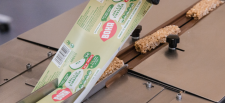The Office for National Statistics (ONS) has published the latest consumer price inflation rates, finding that the 12-month inflation rate for food had risen.
The Consumer Prices Index including owner occupiers’ housing costs (CPIH) rose by 4.1% in the 12 months to August 2025, down from 4.2% in the 12 months to July. On a monthly basis, CPIH rose by 0.3% in August 2025, compared with a rise of 0.4% in August 2024.
The Consumer Prices Index (CPI) rose by 3.8% over the year to August 2025, which was unchanged from July. On a monthly basis, CPI rose by 0.3% in August 2025, the same rate as in August 2024.
Food inflation up on the month
Looking at the performance of food, the 12-month inflation rate for food and non-alcoholic beverages was 5.1% in August 2025, up from 4.9% in July. This was the fifth consecutive increase in the annual rate and the highest recorded since January 2024, but ONS said it remains “well below” the peak seen in early 2023.
On a monthly basis, food and non-alcoholic beverages prices rose by 0.4% in August 2025, compared with a rise of 0.2% a year ago.
ONS reported small upward effects to the change in inflation, specifically from vegetables, milk, cheese, eggs and fish, while bread, cereals, oils and fats partially offset this.
Karen Betts, chief executive of the Food and Drink Federation (FDF), said: “It’s concerning seeing food and drink inflation rise further, to 5.1% in August, when commodity and energy prices are fairly stable. There are still notable pressures on coffee, cocoa, olive oil and dairy prices, but otherwise the continued rise is explained by regulatory and tax costs. This year’s increases to employer National Insurance Contributions, the new packaging tax, business rates rises and the cost of border checks including to Northern Ireland are heaping costs on our sector.
“We need Government to bring down the cost of regulation – so it’s better designed, easier to implement, and better sequenced so it doesn’t all land at once on companies struggling to cope. Manufacturers are looking to the Chancellor in the Budget to ensure we have proper policies and incentives in place to drive productivity growth across food and drink, to offset regulatory and tax costs, and to boost the employment and prosperity that food and drink manufacturing provides in communities up and down the country. She must resist bringing in new costs to ensure the UK is an attractive place to invest.”
“If the Government instead chooses to burden the industry with more costs, then it will be households who feel the pinch as they go about their weekly shop.”
Dr Kris Hamer, director of insight at the British Retail Consortium, commented: “Food inflation climbed above 5% in August for the first time in 18 months as rising employment costs and poor harvests drove up retailers’ costs. With food inflation now outpacing wages, many families will be struggling with the rising cost of living.
“Despite the increase, headline inflation held steady, as declines in categories such as transport and clothing and footwear – driven in part by retailers discounting the last of their summer collections – offset upward pressures. There was some good news in food as key staples such as cereals and pasta fell in price on the month.
“Households across the country are noticing the increasing cost of their weekly shop. Retailers are doing everything they can to deliver great value for their customers, but are unable to absorb the £7 billion in costs they have been landed with this year thanks to rising costs of National Insurance, higher NLW, and a new packaging tax.
“The Chancellor can help turn the tide at the Budget by delivering a meaningful business rates reduction, with no shop paying more as a result. If the Government instead chooses to burden the industry with more costs, then it will be households who feel the pinch as they go about their weekly shop.”









